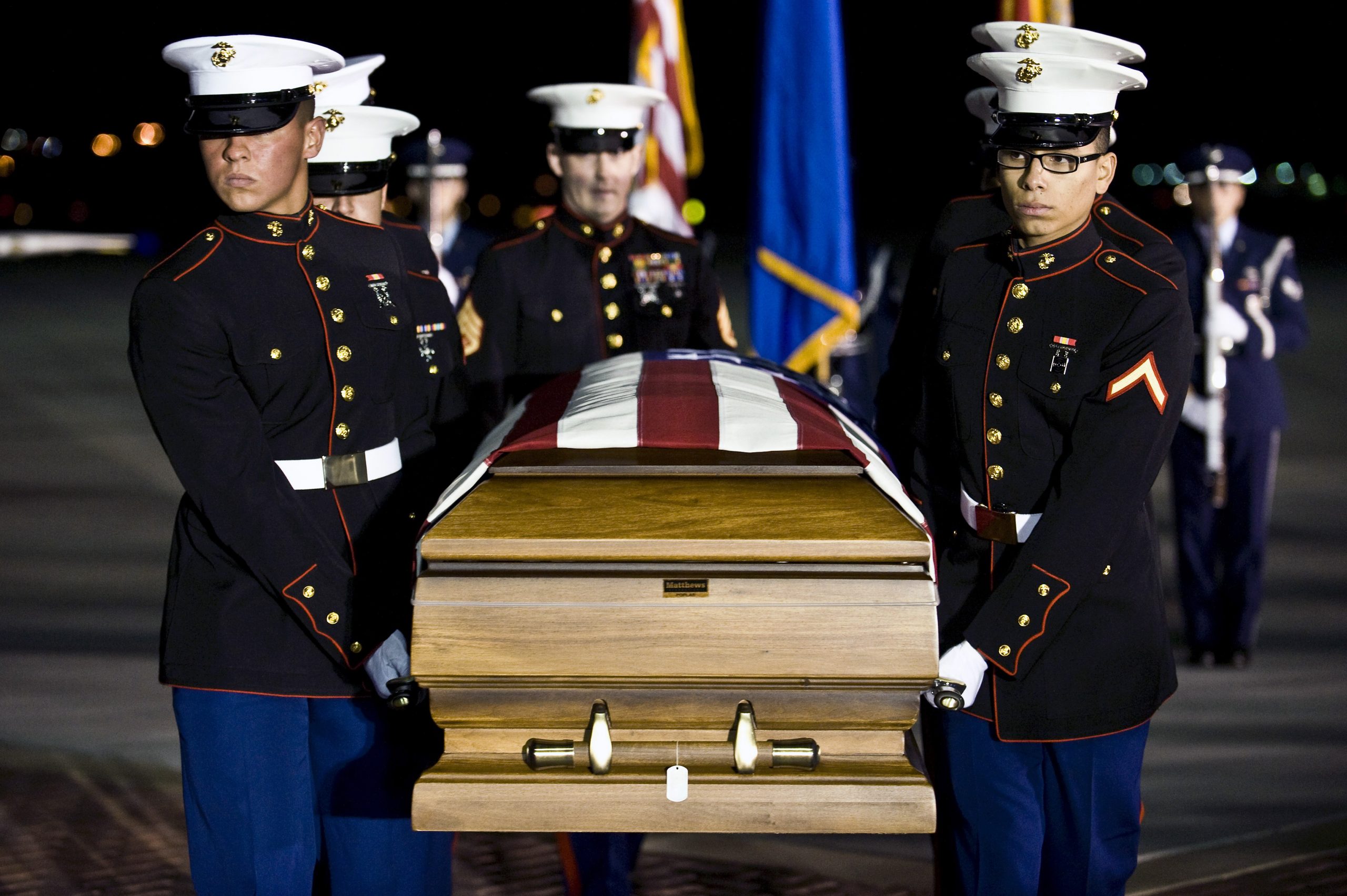A week after four Marines and a sailor were shot and killed at a military installation in Chattanooga, Tennessee, the dead Marines were shipped home.
The four men died on July 16, when 24-year-old Mohammad Youssuf Abdulazeez, at loose ends and possibly under the influence of radical Islam, opened fire on the reserve center where they were working. In the days following the shooting, their bodies had been under the care of FBI investigators at Delaware’s Dover Air Force Base, home of the military’s largest mortuary.
With the forensic work completed, the Marines — Sergeant Carson Holmquist, Gunnery Sergeant Thomas Sullivan, Lance Corporal Squire Wells, and Staff Sergeant David Wyatt — began their journeys back to their families. But they did not travel alone. The Marines provide a uniformed escort for all casualties, whether they’re killed at war or at home, to ensure they are delivered safely and treated with dignity along the way.
Each escort — a Marine of the same rank or higher, chosen from the men’s Battalion HQ in Bristol, Pennsylvania — meets his charge at Dover AFB. The body is dressed in “Blues,” the Marines’ ceremonial uniform, and the escort makes sure that his ribbons are placed in proper order.
Sullivan, 40, who had fought in Iraq, wore two Purple Hearts and a Combat Action Ribbon. Holmquist, 25, did two tours of duty in Afghanistan, and wore a Campaign Medal and two Sea Service Deployment ribbons. Wyatt, 37, a veteran of both wars, wore a Good Conduct Medal and a Humanitarian Service Medal. Wells, 21, had never seen combat, but wore a National Defense Service Medal, a designation for serving honorably. The escort checks that each ribbon is pinned one-quarter of an inch above the left breast pocket.
Each of the Marines is taken from Dover AFB to the Philadelphia airport. When the service member’s body has been loaded onto a hearse and is ready to leave the Dover mortuary, an announcement is made over the building’s intercom. With that, all of the service members working at the facility drop what they’re doing. They form a line along the mortuary driveway and, as the hearse departs, give a ceremonial salute, palms stiff, fingertips pointing north.
Upon arriving at the airport, the escort makes his way to the gate and introduces himself to the counter agent, who leads him out onto the tarmac. There, a mechanical elevator loads a shipping container that holds the casket into the belly of the plane. As it goes up and in, the escort holds a long salute until his Marine settles into place. He watches the crew members shut the cargo bay doors before heading back up to board the plane.
Holmquist’s trip takes him across across the Great Lakes and on to Grantsburg, Wisconsin. Sullivan travels up the East Coast to Springfield, Massachusetts. Wells flies over the Mason-Dixon line to Marietta, Georgia. Wyatt’s grim round trip returns him to Chattanooga.
When the escort and the body arrive at their destination, another team is there to meet them on the runway. As the casket is unloaded from the plane, there is what is called a dignified transfer: The head of the detail, which can include six or eight Marines, gives orders to lift the casket and march it to the next hearse, which is idling nearby. The escort drapes a flag over the casket, performs another salute, and rides with the body to the funeral home. Before parting ways, he checks the Marine’s uniform one last time.
Often, the escort will stay and attend the funeral, where, perhaps for the first time, he learns about the man with whom he’s been traveling — the facts and details that make up a soldier’s story.
Lance Corporal Squire Wells, for instance, was known as Skip to his family and close friends. He participated in Civil War Reenactments and played in the high school band. He had enlisted in the Marines less than a year ago.
Sargent Carson Holmquist liked to fish, and played defensive back in high school for the Grantsburg Pirates. He had a wife and a two-year-old son, who held up a sign when his father returned from his final combat tour in 2014 that read: “Welcome home, Daddy.”
Gunnery Sergeant Thomas Sullivan, who returned from his most recent deployment only this January, had a brother named Joe. He owns a bar in Springfield called Nathan Bill’s, where a party was held in his brother’s honor the weekend after he died. A man dressed in a kilt played the bagpipes, and a group of guys sang “America the Beautiful.”
Staff Sergeant David Wyatt had a reputation for kindness, and like Holmquist, was a father and a husband. His funeral procession begins at the Hixson Methodist Church and finishes at the Chattanooga National Cemetery. His hearse is led by a motorcade, and all the roads are closed along the way. A memorial is held on Amnicola Highway, filled with people who want to say goodbye.
For a moment, the procession pauses so Wyatt’s family can view the tribute. Marines play taps at the funeral, and there is also a 21-gun salute. The soldiers then pick up the spent shells and tuck them into a folded American flag, which is given to Wyatt’s family. It is yet one more show of respect in a chain that began hundreds of miles away at Dover AFB, when an escort first ensured that his ribbons were the regulation quarter-inch above the pocket, an effort to bring order to the senselessness of it all.
[Photo: Senior Airman Brett Clashman]

